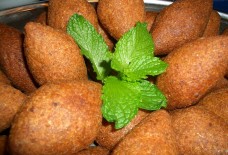Ibrahim Maalouf Gives His Trumpet a Human Voice
By NATE CHINENSEPT.
THE NEW YORK TIMES
Bridging musical cultures comes naturally to the trumpeter and composer Ibrahim Maalouf. Born in Beirut and reared in Paris, he has earned wide acclaim for his work in the Western classical tradition, as well as in Arabic music, film music, jazz and rock. Throughout the Francophone world, and in parts of the Middle East, he operates on the scale of a global pop star.
Mr. Maalouf plays a trumpet with four valves instead of three, which helps him articulate the quarter tones essential to a range of non-Western music. (The pioneer of this instrument is his father, the revered Lebanese classical trumpeter Nassim Maalouf.) Mr. Maalouf’s latest album, “Red & Black Light,” has the sheen and muscularity of contemporary fusion, highlighting the strengths of his longtime band.
This month he will be in the United States with a different project, featuring jazz musicians like the saxophonist Rick Margitza and the drummer Clarence Penn. As he did on his 2015 album “Kalthoum,” Mr. Maalouf will be paying homage to the Egyptian singer Oum Kalthoum, an incandescent voice of the Arabic world. The tour begins on Friday in San Francisco and continues on Saturday at the Monterey Jazz Festival; it is scheduled to reach New York on Sept. 30 and Oct. 1 at the Appel Room, as part of Jazz at Lincoln Center’s fall season.
Mr. Maalouf sees both “Kalthoum” and “Red & Black Light” as tributes to strong women. The newer album includes a simmering cover of the 2011 Beyoncé hit “Run the World (Girls),” with a video set in a dystopian near-future in which women lead an underground resistance against oppressive forces of exclusion. The idea came to Mr. Maalouf in the wake of some recent anti-immigrant statements in France, which he observed with growing alarm.
“I’m just trying to do my job,” he said in a Skype interview from Paris last week. “Music is the best way to make people not be scared of their differences. I think that it helps a lot.” These are edited excerpts from the conversation.
Your father, Nassim, is an innovator on trumpet, someone who adapted the instrument to Arabic music. How did he pass along that knowledge?
When I was young, approximately 7 years old, I asked my father to give me some lessons on trumpet. Right from the beginning, he gave me a trumpet that had this fourth valve, for the quarter tones. He taught me how to play Baroque music and classical music, and simultaneously, he was teaching me to play Arabic music in the old, traditional way, with what we call Tarab. So I grew up learning two musical cultures at the same time. It was not separate.
When you play, do you often think of yourself as emulating a singer?
In the Kalthoum project, yes, because I really took Oum Kalthoum’s voice, all the melodies she was singing, and I precisely played what she was singing. Also, when I was young, and my father used to play at home, I did not like the trumpet because it sounded so loud and so strong and so high. When I grew up and started to have my own way to play, I tried to escape from this style. The way I imagine my sound is something much closer to the human voice. Something that speaks to the ears in a very soft way. Something that does not have to shout.
There’s improvisation in the Arabic music you play, but you’re also improvising in the jazz tradition. Do you feel a connection there?
There are lots of common points between Arabic music and jazz music. Of course, improvisation is the most important one. But there is one common point that everybody skips, which is Africa. You can find African color with the blue note in jazz. The blue note is actually a quarter tone. It’s a note that you lower slightly. This heritage from Africa is a bridge between American culture and Arab culture — when, these days, most people think that those two cultures have nothing to do together, especially with all of what’s happening in terms of politics, society and religion.
What does it mean right now to be a Lebanese trumpeter in Paris, and preparing to tour in the United States?
Everything you do becomes political. People are watching the way you deal with things. I can’t blame them, even though I would like people to listen to my music just as music, not as music played by an Arab. This is the period we’re living in. It’s the situation that makes the music into a statement.
But wasn’t your decision to cover Beyoncé’s “Run the World (Girls),” with that accompanying video, a form of societal critique?
Yes, definitely. I have a friend who dances with Beyoncé, and when I went to her concert in Paris a few years ago, she did some choreography to a song by Oum Kalthoum. Lots of people said that this was disrespectful. I was disagreeing with them. And around the same time, something terrible happened on French television: This famous political woman was speaking live on the nation’s biggest talk show, and she said that France is a white country. I thought, how can a politician say this in the country of liberté, égalité and fraternité? So I was just trying to imagine the worst scenario that could happen. I made that statement because I was scared. I still am scared, actually. And thank God I’m a musician, and I can express myself through music. Otherwise, I don’t know how I would express myself.
Source: www.nytimes.com


